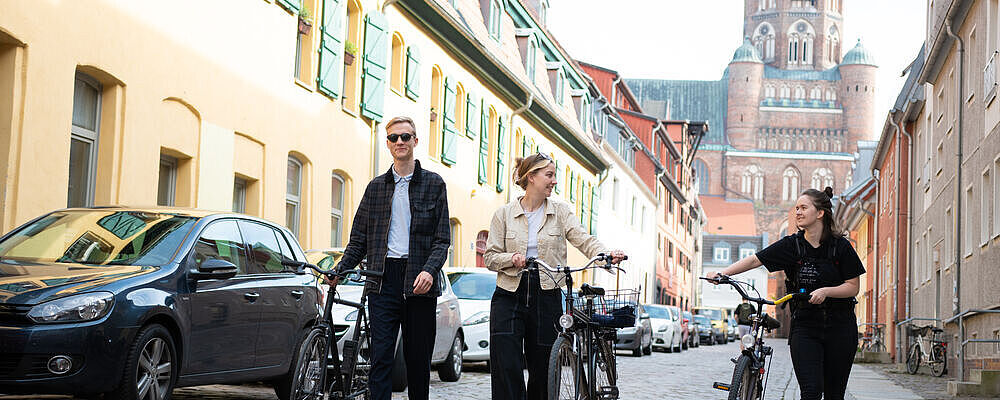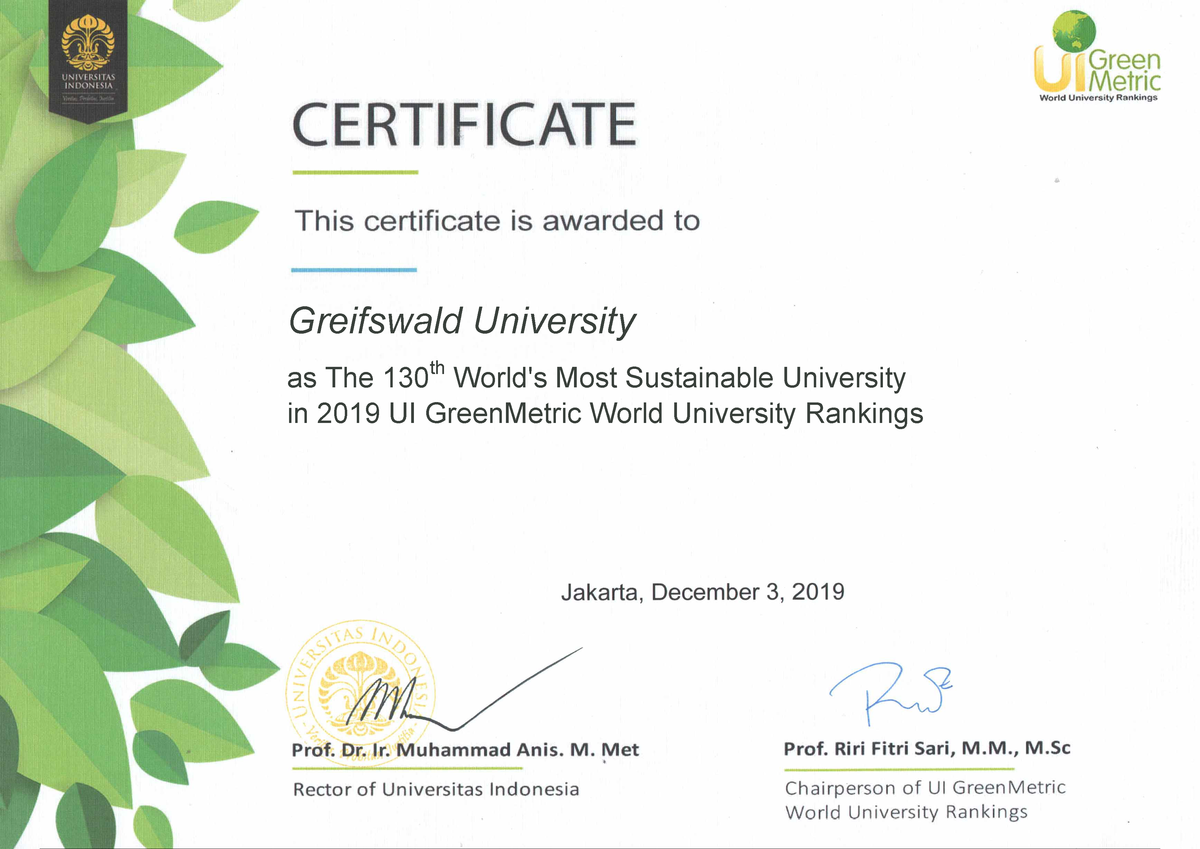Sustainable University
The University of Greifswald contributes to sustainable development on many different levels: in research and teaching, it addresses the theory and planning, as well as the methods related to processes and conditions of transformation, or develops sustainable procedures in applied projects for transfer of knowledge. More and more efforts are also being made to find sustainable solutions in the day-to-day management of the campus and in the university’s administration. All this is only possible through productive exchange about goals and approaches between all member groups of the university and with partners from outside the university.
Our goals for a sustainable university
The University of Greifswald has set itself sustainability goals for its central areas of activity - research, teaching, transfer and administration - and documents these in its Grundordnung (Basic Regulations ) [de] (2003), its mission statement (2012), in the current University Development Plan [de] (UDP 2021-2025) and in goal-specific guidelines.
The university's mission statement names central aspects of sustainability, such as interdisciplinary cooperation and awareness of the consequences of one's own actions, as important elements of its research practice. The objective of preserving natural resources is specifically related to ecological sustainability.
In terms of transfer, the UDP 2016-2020 and the university's Transfer and Innovation Strategy formulate the goal of further supporting and expanding the transfer achievements already made in the field of sustainability.
The mission statement places particular emphasis on the climate and environmentally friendly running of the university and has set the goal of becoming CO2-neutral. The economical and climate-friendly use of energy in the construction and operation of university buildings is presented in the UDP 2016-2020, referencing the new University Computer Centre, the University Library and the expansion of systematic energy management.
To achieve the goal of CO2-neutrality, the Senate Sustainability Committee has developed Guidelines [de] and the Climate Protection Strategy [de], which have been approved by the Senate. They form the basis for reporting on the university’s emissions of greenhouse gases as well as for specific measures, especially climate protection. A mission statement and guidelines for the sustainable use of agricultural land owned by the university were also developed and adopted by the Senate in 2018.
Overcoming challenges together
‘By passing its ambitious Climate Protection Strategy, the University of Greifswald is showing that commitment towards sustainability requires rigorous implementation of specific action. The extensive debates on this strategy have made it clear that we are faced with immense challenges that we will only be able to overcome (which I am personally convinced we shall) if we face them together.’
Prof. Dr. Katharina Riedel
Rector of the University of Greifswald
Climate Protection Strategy of the University of Greifswald
Climate neutral by 2030
The University of Greifswald’s Academic Senate passed a resolution at its September 2021 session that paves the way for reaching carbon neutrality by 2030. With this decision, the University acknowledges its social responsibility. In order to be able to achieve the goal of CO2-neutrality by 2030, five working groups were set up for the university's central areas of activity:
1. Working Group Steering Group
2. Working Group Energy and Buildings
3. Working Group University-Owned Property
4. Working Group Mobility, IT and Logistics
5. Working Group Purchasing and Contracting
These working groups will help to develop a comprehensive CO2 footprint for the university for the first time. This will be used in turn to develop and implement measures.
University greenhouse gas balance
t CO2 equivalents
6098
according to the calculations of the University of Greifswald’s current greenhouse gas emissions (reference year 2021)
Climate Report 2022
The Climate Report 2022 summarises the achievements made in 2022 in implementing the University of Greifswald’s Climate Protection Strategy [de], which was passed by the Academic Senate in 2021.
The University of Greifswald's goal is to achieve climate neutrality by 2030. To this end, five working groups were formed for the various fields of activity (steering group, campus and energy, mobility, university-owned property, and purchasing and contracting), each consisting of members from all member groups of the university as well as external experts. The main focus of the working groups’ tasks was to prepare the first comprehensive greenhouse gas balance [de] for the university and to develop and set the course for the first measures for effective reduction of greenhouse gas emissions.
GreenMetric World University Ranking
The international sustainability ranking GreenMetric World University Ranking (GMWUR) has been conducted annually since 2010. The aim is to compare and promote the level of sustainability at higher education institutions around the world. It is the first and so far only worldwide ranking of its kind and assesses six groups of indicators, which are assessed using a catalogue of 69 questions:
• General higher education infrastructure
• Energy and climate protection
• Waste
• Water
• Transport
• Studies
The data for the University of Greifswald (excluding University Medicine Greifswald) is collected by the Sustainability Officer and processed for the ranking.
In 2019, the University of Greifswald achieved 130th place in the international sustainability ranking by the Universitas Indonesia. This places it among the top 20 percent. A total of 780 higher education institutions from all over the world took part in the ranking.





